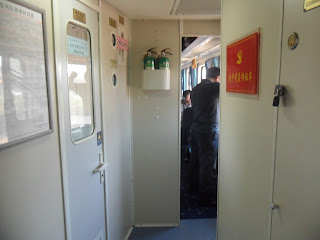Interacting with the locals
As a non-mandarin speaking BBC, It's common for us to experience all kinds of prejudice from getting confused looks when Its found out we arent mainlanders/locals... to English teacher job interviews where a white english teacher is chosen over us native English speakers....just because he is white( and some cases English is not even his native language).
One specific incident I experienced was in a 7-11.
Typically, after 2 weeks in China I was used to having shopped for my groceries, with no problem, typically handing them to the cashier and wait for her to tally the cost waiting for the bill to be given to me, but on this occasion she asked me a question, which may have loosely translated into something like ' do you need a bag' and when I replied ' wo ting bu dong' she started laughing and started muttering under her breath to her friend sitting beside her,in disbelief, no doubt probably thinking that this Chinese guy infront of her was making a joke, that he didn't understand.
In retrospect I should have followed up by asking her ' ni shur yin wen ma? ( do you speak english) ' but that would in my eyes would've exposed me as a being an overseas Chinese and i guess idealism and mainly wanting to save face overcame the reality that my Mandarin is very basic apart from a few words and some basic vocabulary, that isnt up to conversation level just yet..
My other experience was when was taking the train from Beijing to Taiyuan.
A ticket inspector asked me for my ticket and I showed it to her. What I didn't realise is that when I got back to my sleeper, she was still following me. My friend who was sitting on my sleeper spoke to her and then told me that she wanted my ticket - and thought that because I was walking away from her, I was mentally unstable!
But on the whole, I don't think the discrimination was that bad - to be honest, my experience with Canto FOBS in the UK tend to be worse due to their directness, and in my experience they make it damn clear when they look down on your comparitively rusty Cantonese.
In Guangzhou too,I had similar problems, although again,mainly avoided partly because of my mainlander friend accompanying me spoke Mandarin and partly because a lot of the communication can be achieved through body language and basic Cantonese.
Even the Beijing hotel receptionist who werent used to dealing with non-mandarin clients, by the end of my second week had gotten used to me speaking only English and showed appreciation when I made a basic effort to communicate in Putongua.
For obvious reasons Mainland Chinese dont really take too much interest in your problems as a BBC, but thankfully, most problems can be overcome by having a basic understanding and self expression of putongua and obvious body language. And since arriving back to the U.K. , I've resumed my Putonghua lessons seriously so hopefully these kind of language problems won't happen as much on my next trip. We shall see.
Typically, after 2 weeks in China I was used to having shopped for my groceries, with no problem, typically handing them to the cashier and wait for her to tally the cost waiting for the bill to be given to me, but on this occasion she asked me a question, which may have loosely translated into something like ' do you need a bag' and when I replied ' wo ting bu dong' she started laughing and started muttering under her breath to her friend sitting beside her,in disbelief, no doubt probably thinking that this Chinese guy infront of her was making a joke, that he didn't understand.
In retrospect I should have followed up by asking her ' ni shur yin wen ma? ( do you speak english) ' but that would in my eyes would've exposed me as a being an overseas Chinese and i guess idealism and mainly wanting to save face overcame the reality that my Mandarin is very basic apart from a few words and some basic vocabulary, that isnt up to conversation level just yet..
My other experience was when was taking the train from Beijing to Taiyuan.
A ticket inspector asked me for my ticket and I showed it to her. What I didn't realise is that when I got back to my sleeper, she was still following me. My friend who was sitting on my sleeper spoke to her and then told me that she wanted my ticket - and thought that because I was walking away from her, I was mentally unstable!
But on the whole, I don't think the discrimination was that bad - to be honest, my experience with Canto FOBS in the UK tend to be worse due to their directness, and in my experience they make it damn clear when they look down on your comparitively rusty Cantonese.
In Guangzhou too,I had similar problems, although again,mainly avoided partly because of my mainlander friend accompanying me spoke Mandarin and partly because a lot of the communication can be achieved through body language and basic Cantonese.
Even the Beijing hotel receptionist who werent used to dealing with non-mandarin clients, by the end of my second week had gotten used to me speaking only English and showed appreciation when I made a basic effort to communicate in Putongua.
For obvious reasons Mainland Chinese dont really take too much interest in your problems as a BBC, but thankfully, most problems can be overcome by having a basic understanding and self expression of putongua and obvious body language. And since arriving back to the U.K. , I've resumed my Putonghua lessons seriously so hopefully these kind of language problems won't happen as much on my next trip. We shall see.




